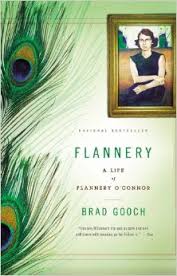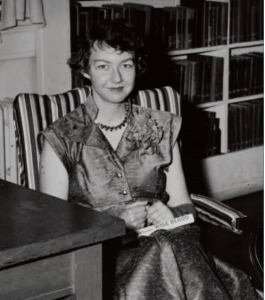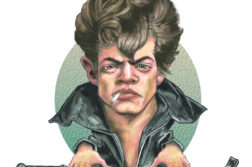 Flannery: A Life of Flannery O’Connor
Flannery: A Life of Flannery O’Connor
by Brad Gooch
Little Brown, 448 pages, $30.
SHE HATED the work of Truman Capote, Tennessee Williams, and Carson McCullers (Clock Without Hands was “the worst book I’ve ever read”). The sort of book she gave close friends was Romano Guardini’s The Lord, or Thomas Merton’s The Seven Storey Mountain, or Teilhard de Chardin’s The Phenomenon of Man. What she read every night in bed before turning out the light was Thomas Aquinas—surely one reason she called herself a “thirteenth century soul.” When Mary McCarthy (the “Big Intellectual”) admired the Eucharist as a symbol, she famously said, “Well, if it’s a symbol, to hell with it.”
She was also the only child of a prominent Savannah family with a mansion in Milledgeville, Georgia; a woman who appreciated Katherine Anne Porter’s “social grace” for inquiring about a pet chicken of hers that Porter had encountered on a visit two years before. She had piercing blue eyes and was devoid of self-pity. She and her mother Regina were both strong Southern women for whom the term “steel magnolias” does not do justice. “Steel girders” would be more like it—all under the guise of the ultimate hard surface: Southern manners. She was also as competitive as any writer—McCullers claimed she stole material from Member of the Wedding, and this biography points out things she lifted from Faulkner—and as ambitious. Taken up early on by literary big brothers such as Paul Engle, John Crowe Ransom, and Robert Lowell, she was the epitome of the MFA experience, notably at Iowa just after World War II, when everyone still met in Quonset huts. She was allowed to stay at Yaddo, the writers’ retreat, as long as she wished (which she did, until she got sick), though she never got a Guggenheim—hard to imagine why, given the people who recommended her—and before she died at 39 was picking up honorary degrees and lecturing at colleges all over the eastern half of the U.S. She was nevertheless a rural novelist, living on a farm with her mother and her beloved peafowl because of a hereditary illness (lupus), welcoming visitors after 3:30, and maintaining an extraordinary correspondence. And yet, her innermost self eludes us. I am talking, of course, about Flannery O’Connor, the subject of a touching new biography by Brad Gooch.
It is the bane of biographers to have their subjects’ lives recounted in reviews while the biographer’s work is hardly mentioned; and most of the enthusiastic reviews Gooch’s book has received so far have done exactly that. But it’s easy to see why: the story of this woman is so original as to be irresistible. Gooch’s biography comes in at just 387 pages (restrained, in the Age of Information; the latest biog of Cheever is over 700), with ten pages of acknowledgments and 48 of footnotes. Even where a fact seems irrelevant (if you bought a Sears house in the 1930’s, you could return the lumber if there was a knot in it), one doesn’t mind, because it contributes to a portrait of Georgia in the 40’s and 50’s that is the milieu in which O’Connor wrote. Much of the story is depicted with the skill of a novelist (Gooch wrote The Golden Age of Promiscuity), which makes it at times extremely moving, especially at the close, where Gooch’s peroration rises to real eloquence.
Now back to O’Connor: she was not a saint, even though, when you finish the book, you feel you have read the life of one. She was, however, a Roman Catholic who felt joy when friends converted to  the Church and deep regret when they left it. Knowing someone else was Catholic seems to have brought O’Connor a sense of relief and solidarity, the sort a gay person might feel on landing in a new place to learn that another gay person lives there. She was even rescued by a theologian— Teilhard de Chardin, a writer who seemed to save her from that desert where a writer feels she has dried up. She went to Mass every day. When she was sick, she went to Lourdes; in Rome she was inspired by an audience with the Pope, though she was glad to see the changes instigated by his successor, Pope John XXIII, at the Vatican Council, which, she told a friend, was “clearly the work of the Holy Spirit.” Toward the end of her life she gave talks about the role of the Catholic writer. Even the considerable blows that life dealt her were transformed by faith. The death of her father when she was fifteen she described as the power of God hitting her “like a bullet in the side,” inducing not only grief but wonder. However, it is characteristic of O’Connor, and of this biography, that we learn no more than that about her feelings relative to this loss, much less her own suffering from the disease that killed both of them.
the Church and deep regret when they left it. Knowing someone else was Catholic seems to have brought O’Connor a sense of relief and solidarity, the sort a gay person might feel on landing in a new place to learn that another gay person lives there. She was even rescued by a theologian— Teilhard de Chardin, a writer who seemed to save her from that desert where a writer feels she has dried up. She went to Mass every day. When she was sick, she went to Lourdes; in Rome she was inspired by an audience with the Pope, though she was glad to see the changes instigated by his successor, Pope John XXIII, at the Vatican Council, which, she told a friend, was “clearly the work of the Holy Spirit.” Toward the end of her life she gave talks about the role of the Catholic writer. Even the considerable blows that life dealt her were transformed by faith. The death of her father when she was fifteen she described as the power of God hitting her “like a bullet in the side,” inducing not only grief but wonder. However, it is characteristic of O’Connor, and of this biography, that we learn no more than that about her feelings relative to this loss, much less her own suffering from the disease that killed both of them.
The book implies that she was uncomfortable with sex; that may be why, presumably, she wrote a friend: “Mr. Truman Capote makes me plumb sick, as does Mr. Tenn. Williams.” Or why she had to sit in a car one day with a writing instructor at Iowa and have the mechanics of sex explained to her so she could correct a scene she had just written. Or why she was furious when The Kenyon Review published a story of hers with an inch-high illustration of a character naked, and why she thought Lady Chatterley’s Lover was “pious slop.” When someone wrote to ask about a lesbian subtext in the story “A Temple of the Holy Ghost,” she wrote back: “as for lesbianism I regard that as any other form of uncleanness. Purity is the twentieth centuries [sic]dirty word but it is the most mysterious of the virtues.” When a female friend confessed in a letter from Japan, “Oh Flannery, I love you too. Did you know that? I almost said it when we were standing by a fence. … What would you have done if I had come up with it?” Flannery wrote back; “It is grace and it is the blood of Christ and I thought, after I had seen you once that you were full of it and didn’t know what to do with it or perhaps even what it was. Even if you loved Faulkes and Ritche and me and Emmet and Emmet’s brother and his girl friend equally and undividedly, it all has to be put somewhere finally.” Her correspondent took this as an evasion and did not write back for months. When her friend Betty Hester came out to her by confessing that she had been discharged from the Army for sexual impropriety with a woman in Germany, O’Connor told Hester that her sexual past meant nothing; only her present mattered, because she had been redeemed. It was Hester who sat sobbing mightily at O’Connor’s funeral Mass and who told a novelist years later, “As you must sense, I did love her very, very much—and, God knows, still do.”
Yet her baleful humor, her black comedy, her puncturing of pretension, and her affection for freaks make us feel she’s one of us; for if homosexuals aren’t freaks in this world, what are they? Somewhere between O’Connor’s visceral disgust with Lawrence–Capote–McCullers–Williams and the way she handled her two friends’ coming out, I think, is O’Connor’s attitude toward homosexuality. For her own part, O’Connor was clearly subject to the appeal of men. The one cruel quote in Gooch’s book is the reminiscence of a handsome Dane who appeared in O’Connor’s life as a textbook salesman assigned by her publisher to the Southeast who, at their final meeting, kissed our heroine—and said after she died that it was like kissing a skeleton. (Years later, someone asked O’Connor’s mother if her daughter had suffered over the news of the Dane’s marriage to another woman, and her mother said, looking down at the ground: “Yes, she did, it was terrible.” Out of it, however, came one of the greatest short stories every written, the hilarious and bleak “Good Country People.”) O’Connor, like Proust, must have felt a sense of abandonment, not to mention a reminder of what she would never have, every time one of her friends got married. If so, it was a sorrow she hid beneath the impeccable politeness that came with her Southern upbringing. If there were ever any comment on misfortune of any kind, it was always served up with the mordant sense of humor with which she viewed all of life—the thing, really, that makes her a great writer and attracts us to her.
So much of this humor in her fiction comes from the clash between free-thinking intellectuals and the God-haunted country people O’Connor used as her surrogates—because she was haunted by God, too, and that allowed her to both mock and identify with them. Elizabeth Bishop felt poetry had lost a great talent because O’Connor happened to use prose, but O’Connor was also a cartoonist to the end, the way Daumier was; and she had a lot of material to work with. She had escaped Georgia, was already hob-nobbing with the great and good of literature (Robert Lowell, Robert Fitzgerald, Caroline Gordon) up north, and might, conceivably, have ended up some kind of Manhattan intellectual, when illness brought her back to a place where she found all her characters—on her mother’s farm, in the doctor’s waiting room and the pages of the local newspaper. The reason O’Connor reminds one of Gerard Manley Hopkins (though his isolation was much worse than hers) is that she was exiled, too—in her case to her hometown. But that was where she found what she needed for her art. (One local lady would not visit because she was afraid O’Connor would put her in one of her stories.)
She also reminds one of Evelyn Waugh—who ended up seeing everything via Catholicism—in the depth of their disgust with modern life, not to mention their gallows humor and willingness to knock characters off in very brutal ways. Hawthorne, however, was the writer she identified with toward the end of her life, in part because he wrote romances, and not novels—a form with which O’Connor always had difficulty. (Her novel Wise Blood took five years to write, “Good Country People” four days.)
GOOCH’S FLANNERY is slow going at first. The first two chapters are so detailed, so bland—an account of every piece of writing, every cartoon O’Connor drew in high school and college—that the temptation to skim is irresistible. Childhood, however, is the obligatory dullness of most biographies, and after that Flannery gets better and better, and long before the end it is hard to put down. But there is one thing missing, I think, that has to do with O’Connor’s faith. In the biography of a writer whose library surprised Caroline Gordon with the depth and sophistication of its theological works—in the life of a woman who read Thomas Aquinas every night before turning the lights out—what one misses is some words on O’Connor’s own theology.
That O’Connor was a Catholic writer was held against her while alive and dead; even as her editor, Robert Giroux, was accepting a posthumous award for her last book, a prominent writer asked him if O’Connor could really be taken seriously because of it. Yet one finishes Flannery wondering: just why was Catholicism so vital to her? Was she a Catholic simply by upbringing, a person whose childhood was so religious that she never left it? The priest who presided at her funeral mass was a cousin. Her first television was the gift of some nuns belonging to the Dominican order founded by Nathaniel Hawthorne’s daughter Rose, an exchange for O’Connor’s writing an introduction to a memoir of the girl who died of cancer in their care. But did she never doubt or despair? Did she have no difficulties whatsoever with faith? (Once, when someone asked what she believed, she simply replied by reciting the Credo.) We finish Flannery without ever really knowing much about her spiritual life. She is now an academic industry—and there are surely papers and books aplenty about this, including collections of her letters and her occasional writing—but it would have been helpful to have a page or two on her religious thought, even in a biography that is more anecdotal than analytical.
Religion provides a way of looking at the world—and so does homosexuality, which makes one wonder why the rubric “Also by Brad Gooch” lists only the author’s biography of Frank O’Hara, City Poet—but not his novel The Golden Age of Promiscuity, or Dating the Greek Gods, or, heaven forefend, Finding the Boyfriend Within. No doubt one can argue that to a biography only a previous biography is relevant; but one also wonders if the strictures of Southern gentility (something O’Connor liked to subvert) are not calling the shots here, or perhaps the discordance of being a “gay” writer (as marginalizing, surely, as being a “Catholic” one) in a world where many people, inside and outside the Vatican, still view homosexual acts as unclean and impure. Of course, it could just be a question of marketing.






